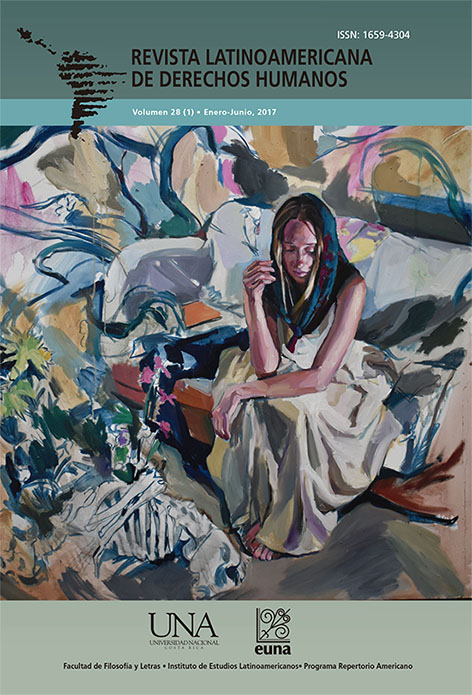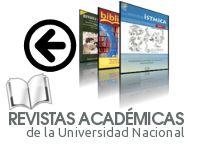Forms of educational support for students with disabilities or educational needs in the Universidad National de Costa Rica, and implications for their professional training
DOI:
https://doi.org/10.15359/http://dx.doi.org/10.15359/rldh.28-1.10Keywords:
educational assistance, disability, educational needs, higher educationAbstract
This article presents the forms of educational support for students with disabilities or educational needs in the university environment, and their implications for these students’ professional training, according to results obtained through the FIDA Proyecto Percepciones y realidades en la atención de las necesidades educativas: propuesta de desarrollo profesional y su implementación en la Universidad Nacional (código 0524-10) del año 2012 al 2015. [Project Perceptions and realities in addressing educational needs: professional development proposal, and its implementation in the Universidad Nacional) (code 0524-10) between 2012 and 2015)[. One hundred and ninety-one students participated in this study (76 men and 115 women), who were enrolled in different careers in several UNA Sites (Central, Brunca, and Chorotega), as well as 427 staff members (181 men, and 246 women). The methodology uses a qualitative approach; 15 workshops and 65 individual interviews were conducted with students to gather their observations. It was found that only some of the students receive individual assistance (during and outside classes), and occasionally tutoring (in English, Mathematics and Chemistry) by academic staff of the institution in the Central Site. For instance, more time is provided for them to take exams, during which they receive individual instructions; this is also done when they prepare research projects. One finding that stands out is that most students of UNA Regional Sites stated that their opinion is not taken into consideration by academic staff when determining and implementing adjustments in methodology or for evaluating the courses they receive. On the other hand, in the Central Site, most members of the group of students with disabilities talk with academic staff about defining at least types of adjustment or educational assistance.
References
Aguilar, G, and Monge, G. (2008) La Educación Especial en Costa Rica: antecedentes, evolución, nuevas tendencias y desafíos (Special Education in Costa Rica: background, evolution, new trends and challenges). San José: Ministerio de Educación Pública. Unpublished material.
Aguilar, A. (2002). De la integración a la inclusividad la atención de la diversidad pilar básico en la escuela del siglo XX. (From integration to inclusion, to attention to diversity – a key element in schools of the 20th century). Buenos Aires: Ediciones Espacio.
Arce, X. and Venegas, S. (2008). La igualdad de oportunidades para las personas con discapacidad visual de conformidad con la Ley 7600, en los trámites administrativos en el Campus Omar Dengo de la Universidad Nacional (Equal opportunities for persons with visual impairment pursuant to Law 7600, in administrative procedures on the Omar Dengo Campus of the Universidad Nacional). Disertation for the Degree of Licenciatura as a Professional Secretary. Heredia: Universidad Nacional, (Unpublished).
Blanco, R. (1989). Las necesidades educativas especiales en la escuela ordinaria (Special educational needs in regular schools). Madrid: Ministerio de Educación y Comercio.
Borsani, M. (2003). Adecuaciones curriculares (Curricular adaptations). Apuntes de atención a la diversidad. Buenos Aires: Ediciones Novedades Educativas
Castillo, A. and Bonilla, A. (2009). Curricular adaptations for adult english language learners in the school of literature and language sciences at Universidad Nacional. Pedagogical proposal for a Master’s Degree in a Second Language and Cultures with a major in English as a Foreign Language for adults and children. Heredia: Universidad Nacional, (Unpublished).
Fontana, A. (2004). Atención a la diversidad: talleres para docentes de I y II ciclos (Attention to diversity: workshops for teachers of first and second cycles). Didactic proposal for a Master’s Degree in Pedagogy with a major in Diversity in Educational Processes. Heredia. Universidad Nacional, (Unpublished).
Fontana, A., Espinoza, A. and León, H. (2009). Implementación de las adecuaciones de acceso en las instituciones educativas costarricenses (Implementation of adaptations for access in Costa Rican educational institutions). San José, Costa Rica: CENAREC
Fontana, A. and Rodríguez, R. (2012- 2015). Formulación del Proyecto Percepciones y realidades en la atención de las necesidades educativas: propuesta de desarrollo profesional y su implementación en la Universidad Nacional código 0509-10. (Formulation of the Project Perceptions and Realities in attention to educational needs: professional development proposal and its implementation at the Universidad Nacional, code 0509-10). Heredia: Vicerrectoría Académica. Universidad Nacional. (Unpublished).
Gurdián, A. (2007). El Paradigma Cualitativo en la Investigación Socio-Educativa (Qualitative paradigm in Socio-Educational Research). San José, Costa Rica.
Lou Rayo, M.A. (2011). Atención a las necesidades educativas específicas (Attention to specific educational needs). Secondary Education. Madrid: Ediciones Pirámide
Ministerio de Educación Pública (MEP). (2005a). Políticas, Normativa y Procedimientos para el Acceso a la Educación de los estudiantes con Necesidades Educativas Especiales (Policies, Regulations and Procedures for Access to Education of Students with Special Educational Needs). San José: MEP publications.
Ministerio de Educación Pública (2005b) La atención de las necesidades especiales en Costa Rica. Información Básica en torno de las adecuaciones curriculares y de acceso (Attention to educational needs in Costa Rica. Basic information about curricular and access-related adaptations). San José: CENAREC
Miranda, G. (2009). Actitudes del personal académico universitario hacia el estudiantado con discapacidad y su relación con el desempeño académico: un estudio de caso Universidad de Costa Rica (Attitudes of university academic staff towards students with disabilities, and their relationship with academic performance: a case study at the Universidad de Costa Rica). Final work for a Master’s Degree in Psychology. Heredia: Universidad Nacional, (Unpublished).
Organización de las Naciones Unidas. [ONU]. (2006, Noviembre 3).
Convención sobre los Derechos de las Personas con Discapacidad. Available at http://www.un.org/spanish/disabilities/pdf/SpanishCPRD.CSP.2008.1.pdf
Puigdellivol, I. (1998). La educación especial en la escuela integrada (Special education in integrated schools). Spain: Editorial Graó.
Sánchez, A. and Torres, J.A. (2002) Educación Especial. Centros educativos y profesionales ante la diversidad (Special Education. Educational centers and professionals confronting diversity). Madrid: Ediciones Pirámide.
Soto, R. (2007). Actitud docentes de la Universidad de Costa Rica hacia los (as) estudiantes con discapacidad (Universidad de Costa Rica’s teacher attitudes towards students with disabilities). Final work for a Master’s Degree in Education. San José: Universidad de Costa Rica, (Unpublished).
Universidad Nacional. (2005). Políticas institucionales (Institutional Policies). Gaceta UNA 01-2005 amended in the Gaceta UNA 04-2014.
Accessed at http://www.documentos.una.ac.cr/handle/unadocs/1149
Universidad Nacional. (2013). Gaceta UNA 15-2013 Accessed at
http://www.documentos.una.ac.cr/bitstream/handle/unadocs/2552/UNA-GACETA%2015-2013.pdf?sequence=1
Published
How to Cite
Issue
Section
License
El material que se publica en esta Revista está bajo una licencia “Creative Commons” 3.0 Costa Rica (CC, Reconocimiento-NoComercial-SinObraDerivada 3.0 Costa Rica (CC BY-NC-ND 3.0 CR) . Esto significa que el material publicado en la revista se puede compartir (copiar y distribuir) en cualquier medio o formato considerando que se debe reconocer de forma adecuada la autoría del material y la fuente, no puede utilizarse con fines comerciales y no se aceptan las obras derivadas (remezclar, transformar o crear a partir del material).








